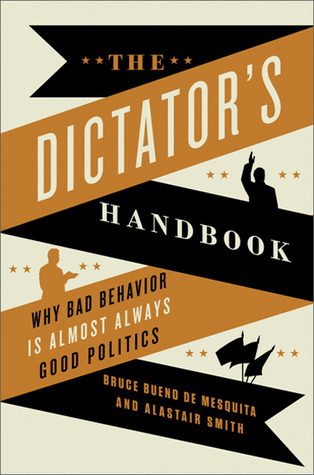
The Dictator's Handbook: Why Bad Behavior Is Almost Always Good Politics
Book Description
Power corrupts, but why does it thrive? In "The Dictator's Handbook," Bruce Bueno de Mesquita unveils the ruthless game of politics, where moral lines blur and self-interest drives even the most despotic rulers. By dissecting the strategies that sustain regimes—from manipulation to betrayal—this gripping analysis reveals why bad behavior often leads to political triumph. With vivid examples and sharp insights, it challenges the notion of virtue in leadership, forcing a re-examination of loyalty and choice in the corridors of power. What if the keys to understanding our world lie not in ideals, but in the dark arts of manipulation?
Quick Book Summary
"The Dictator’s Handbook" challenges conventional wisdom about politics by arguing that self-interest, not virtue, is the true driver of political behavior. Author Bruce Bueno de Mesquita unveils the ‘rules’ that underpin all political systems, from democracies to dictatorships, showing how leaders stay in power by rewarding loyal supporters and marginalizing the general population. Using historical and contemporary examples, the book illustrates how the logic of political survival often compels rulers to adopt ruthless, seemingly immoral strategies. It posits that the difference between good and bad leaders is not moral fiber but the structure of their coalitions, or "selectorates." Ultimately, the book compels readers to question their assumptions about leadership and government, suggesting reform must focus on changing incentives rather than expecting virtue.
Summary of Key Ideas
Table of Contents
Leaders and the Logic of Political Survival
Political power, according to "The Dictator’s Handbook," is fundamentally about survival. Leaders—whether democrats or dictators—are incentivized to do whatever is necessary to remain in office. The book argues that political behavior is guided by the same basic logic across systems: rulers must secure support from a critical coalition of key backers, and all actions flow from this core necessity. Whether it means building roads or embezzling funds, the end goal is ensuring the continued loyalty of those who hold the balance of power.
The Role of the "Selectorate" and Winning Coalition
Central to the analysis is the concept of the "selectorate": the set of individuals who have a say in choosing the leader. This group can be vast, as in democracies, or small, as in autocracies. Within the selectorate is the "winning coalition," the minimum group a leader needs to remain in power. Leaders in systems where the winning coalition is large must serve broader interests, while those with small coalitions can focus resources on rewarding this select group, often at the expense of the general population.
Why Corruption and Bad Behavior Persist
The book explains why corruption, rent-seeking, and bad governance are not only common but rational from the perspective of political survival. Leaders will often skim national wealth to appease their core supporters—or eliminate rivals—because the risk of losing power is greater than the cost of bad policy. These actions, while ethically questionable, are often rewarded within the system, and efforts to rule by high-minded ideals can easily backfire if coalition loyalty wavers.
Manipulation, Loyalty, and Betrayal in Politics
Historically and in the present, manipulation, betrayal, and shifting alliances are standard features of politics. Whether through purges, coups, co-optation, or patronage, rulers constantly adjust tactics to maintain power and preclude threats. The book uses examples from monarchies, communist regimes, and modern democracies to demonstrate how even democratic leaders are compelled by this logic, albeit constrained by rules that widen the selectorate and winning coalition.
Lessons for Reform and Political Change
The authors suggest that lasting reform cannot rely on changing the character of leaders but must focus on altering institutional incentives. Policies that expand the winning coalition and selectorate can produce more accountable, effective governance. By understanding that leaders respond to self-interest and survival, citizens can push for changes to the rules of the political game, rather than hoping for rare virtuous politicians to emerge.
Download This Summary
Get a free PDF of this summary instantly — no email required.





